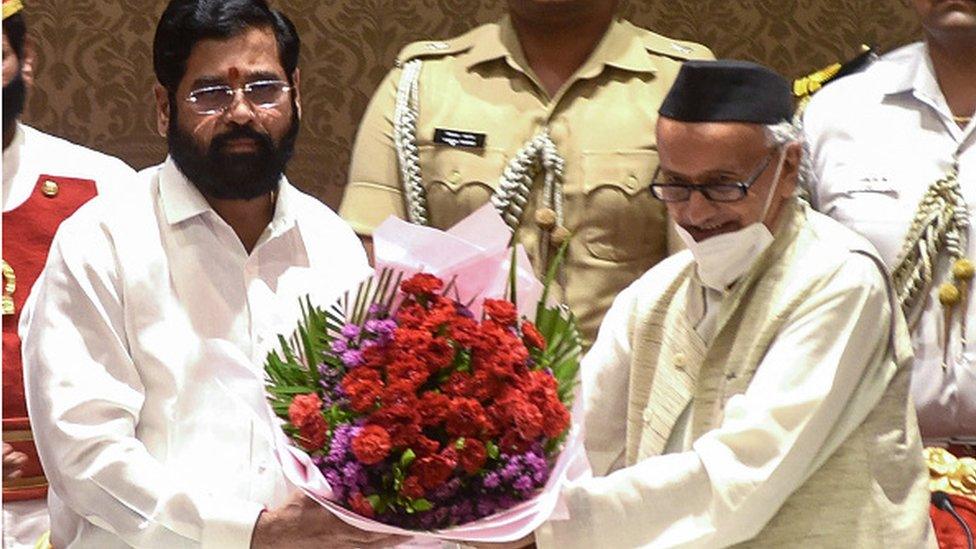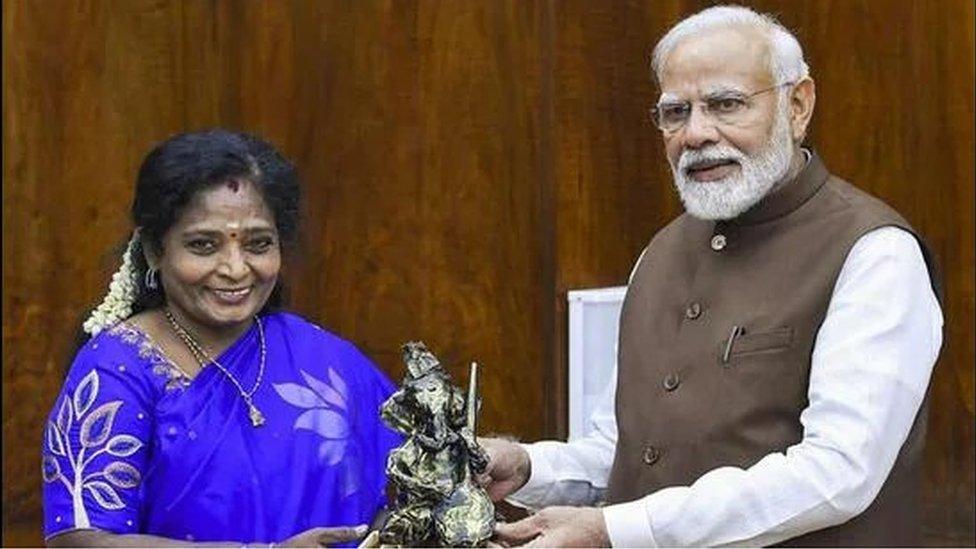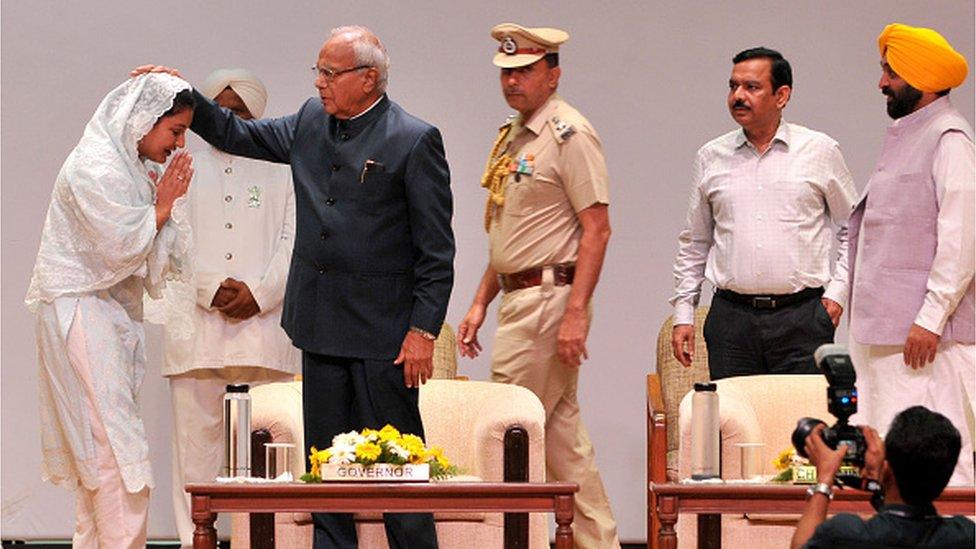Should India abolish its state governors?
- Published

The leader of the rebel-led coalition and the new chief minister of Maharashtra Eknath Shinde with the then governor Bhagat Singh Koshiyari (right) last June
Last week India's Supreme Court fretted that the country's governors could end up undermining democracy if their actions triggered the fall of a functioning state government.
The top court alluded to the governor of the western state of Maharashtra who called for a controversial confidence vote in the assembly last year, leading to the fall of the government there.
Uddhav Thackeray's regional Shiv Sena was the largest party in the coalition ruling Maharashtra. But defecting rebels split the party and cobbled together a new alliance with Narendra Modi's Bharatiya Janata Party (BJP), which rules India. The state's governor, Bhagat Singh Koshyari, then called for a vote of confidence, but Mr Thackeray resigned in June before the vote, "accepting" that his supporters had been reduced to a rump.
Hearing a clutch of petitions relating to the matter last week, India's Chief Justice Dhananjaya Chandrachud said the trust vote had been "wrongly summoned", external by the governor. "The governor cannot enter into any area by which his action would precipitate the fall of a government," he said. "This is very, very serious for our democracy."
That's not all. In the southern states of Kerala, external and Telangana, external governments have blamed governors for refusing to sign bills into laws - the government in Telangana has gone to the Supreme Court, accusing the state governor Tamilisai Soundararajan of creating a "constitutional impasse". A regional party runs Telangana, while Kerala is ruled by an alliance of left-wing parties. The governors in both states - and in Maharashtra - were appointed by the BJP, their political rival.

Governor Tamilisai Soundararajan is seen here with Narendra Modi, whose government appointed her
India's governors, appointed by the president on the advice of the prime minister, are constitutional heads of the state. Although they have a largely ceremonial role, they hold a mix of legislative, executive and discretionary powers. During political crises - when a state election, for example, is inconclusive - they can decide which party is best positioned to form a government. They can also withhold assent to bills passed by the legislature. To borrow from a cricketing analogy, the governor is expected to be an "umpire of democracy".
Except that India's governors have long been blamed for being political partisans, doing the bidding of the ruling party at the centre, as the federal government in Delhi is commonly called. Mukul Kesavan, a historian, has noted, external that the manner of their appointment and the uncertainty of their tenure make governors a "creature of the central government in politically charged circumstances rather than a disinterested umpire".
Governments in Delhi have traditionally dismissed governors appointed by their rivals, further politicising the office. A study which looked at the tenures of governors between 1950 and 2015 found that only a quarter had completed their full five-year term - and 37% had lasted less than a year in office.
Defying conventions, governors have often been appointed by the ruling party without consulting the elected state government. This had led to souring of relations between the federal and state governments.

The governor of Punjab state Banwarilal Purohit (second from left) at an oath ceremony of the ministers in 2022
For decades, governors have been seen by many to be meddling in the smooth functioning of elected state governments that were hostile to the party at the centre. BK Nehru, who governed half a dozen Indian states in a long career that ended in the 1980s, himself once described the position as a "burnt out superannuated member of the ruling party for whom a governorship was a kind of luxurious retirement".
Not surprisingly, party loyalists are preferred for the position, often as a reward for their services. A study by Professor Ashok Pankaj on India's governors from 1950 to 2015 found that they were mainly politicians (52%) or retired bureaucrats (26%). Judges, lawyers, defence officials and academicians made up the rest. A fifth of all governors were former MPs or legislators.
That is why many believe the time has come to abolish the office of the governor. "This office is generally an abomination," says Shekhar Gupta, editor of ThePrint. "If it disappeared one day, nothing will happen."
It is possibly easier said than done. Mr Kesavan notes that if the "governors cannot be legislated out of existence, the next best move would be to shrink the office to fit them". An exhaustive new study, external of India's governors called Heads Held High: Salvaging State Governors for 21st Century India by scholars of The Vidhi Centre for Legal Policy think-tank proposes reforming the office rather than getting rid of it.
The authors say appointing and removing governors should not remain the prerogative of the ruling party, and be done in a "more federal and co-operative" manner; and the governor's written reasons for his actions should be made public, among other things. Handing over the responsibilities of the governor to the executive or to judges would risk politicising both, says Lalit Panda, a co-author of the book.
KV Viswanathan, a top lawyer, echoes a similar sentiment. He believes the "problem is not with the office of the governor, but some of the incumbents who come to the office".
"Don't abolish the office. Let sunlight in, record the reasons for a governor's actions, make them public. Be more transparent when appointing them. And make sure they are not used as hatchet men."
BBC News India is now on YouTube. Click, external to subscribe and watch our documentaries, explainers and features.

Read more India stories from the BBC:

